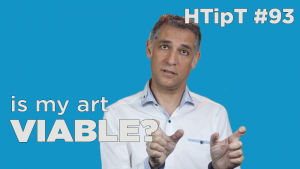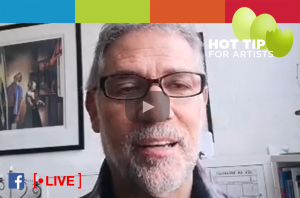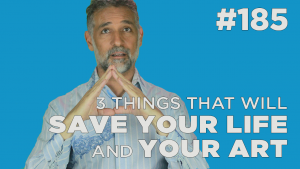Better Branding – find out what your fans say
Find out what your fans say about you and your art.It’s hard for us artists to work on our branding because we are deep inside the creation of our art. Here’s how to get vital outside of that perspective. Comment on this post and share what your customers say about you, and your art.
Posted by Auspicious Arts Incubator on Monday, 6 August 2018
Better Branding – find out what your fans say
Yeah, but what do your customers say about you and your art… It’s hard for us to work on our branding because we are deep inside the creation of our art. Here’s how to get the vital outside perspective. Comment below with what they actually said.
Video Transcript
So, hi everyone. It’s Tuesday, so it’s time for another tip to help you with your arts practice, to help you create that arts business that’s really dynamic and exciting. I’m John Paul Fischbach. I’m the CEO and Chief Alchemist here at the Auspicious Arts Incubator. This week, I want to help you solidify your brand. You have a brand in play. You’re an artist, you’ve been an artist for a while. People know you, people have followed you. You’ve got friends and family, you’ve got customers, you’ve got fans. They all know about you. Okay? You already have a brand in play.
Now, let’s just be clear, the brand is not your logo, it’s not your groovy font, that’s called visual identity. I’m talking about your brand. Your brand comes down to a combination of your likability and your enthusiasm. Your brand answers two questions for people, what are you known for and why do people spend their time and their money with you? So, you have to figure out what that is.
It’s very hard for us. As artists, we’re on the inside of this. So we’re deep on the inside creating it. It’s really hard for us to know what it is that people … where they find the value. What is it that particularity? Right? Here’s the deal, people who consume the arts have an art experience, 80% of them, 80% of them will talk about the experience afterward. So you need to know what it is they say. If there was a way for you to find out how they describe you, how they, what’s called, on sell, yeah. How do they on sell you? How do they talk to their friends, their family members, people that they think should connect to you? What do they say? How do they describe you?
Well that’s vital information for you to build your brand because you have an idea of what you do, what you’re known for, what value there is in what you do, but you kind of guess at that. Really what you want to do is, for developing marketing collateral, for doing any kind of advertising, what’s really critical, what you really want to do, is find out exactly what they say and then use those exact words. Okay? So, that’s your brand. Is finding out what you’re known for, how people describe it, yeah? What is it, of all the work you do, what are you really known for?
When people say, “Oh, you need to meet John Paul. He’s this really cool artist who does …” What? What is it that you want to be known for? Yup. How do they describe your work? You know, a lot of us do work that’s kind of mixed media, it’s in-between things, it’s in-between genres, and some of you guys and gals, invent terms or you use terms that are part of our industry terms, but the general public doesn’t know what that means. Okay? So, if you’re a mixed media artist, I bet your customers and fans don’t know that term. Right?
If you do live art, and you’re in the theater, you know, performing role, I bet that there are people who have no idea what that is that don’t know what live art is. So you always want to find out how other people, that talk about you, describe what you do. How do they describe it? What do that say you’re known for? Okay?
The second question is, “Well why do they spend their time and their money with you?” What’s the value that they see in who you are and what you do? So my encouragements to all of you is to build your brand, you need to build your likeability and your enthusiasm. Nothing is going to do that better then video. So if you’re not producing little videos, posting them on social media, putting them on your website, get in the game. Video is the best way to communicate who you are, what you do, why you do it, how you do it, in tiny tiny little segments. That’s going to build your brand more than anything, is letting people inside your world. Letting people see you, meet you, see your world.
Okay. I want to make these always really, really brief, and give you this concept of branding and understand what that is, and how you can improve it, why you need to improve it. All right. Whatever they say, your fans, your customers, your family, your friends, whatever they say, is more valid then anything you could write up. Truly it is. The artists that are succeeding are using their words, the words of their fans and their customers, verbatim, because that’s how they’re communicating to other people, who you are, what you do, why it’s amazing. Okay?
So here’s your challenge for this week. Think about it. You’ve got family, you’ve got friends, you’ve got fans, you’ve got customers, you might have followers. I want you to just pick two. Make it easy on yourself, so pick two. Pick a friend and a customer. Pick a follower and a member of your family. I don’t know, pick two. Then you’re going to have to ask them, so tell them that you’re trying to improve your brand. Tell them that you’re, you know, that every week you do this challenge with John Paul, to help make your business succeed, because they want you to succeed. Right? They know that you’re an artist, they know you’re in this game, they want you to succeed, so they’ll help you.
Then say, “You know, we’re just talking about branding and I know there’s a brand that I have in play, but I don’t know how people talk about me. I don’t know what people say. So when you try to support me or you try to encourage someone or introduce me to someone or my work to someone, what is it that you say? How do you describe my work?” Pause, and write down exactly what they say or record exactly what they say. If you allow yourself to summarize, you’re going to filter, so don’t. Get … Try to get their words exactly as they came out of their mouth. Okay?
Then the second question is, “So why do you spend your time …” if you’re a performing artist or if you’re an author, “Why do you spend your time with me in my art?” If they’re … If you’re a visual artist and these are customers, then you say, “Well, you know, why do you spend your money on my particular art?” Okay?
You’re looking for what’s called value, right. I talk a lot about value based language, and artists that go through the artist transformation school with us, we spend a lot of time going back to value based language, and teaching artists to use value based language. This is your beginning. This is a beginning way into the whole world of value based language, is to find out why they spend their time and their money.
Okay, you clear? So you have a brand in play. It’s part of your likeability and your enthusiasm, and you’re going to go find two people this week. You’re going to ask them these two questions. How do you describe my work? What am I known for, to you? What am I known for? The second question is, why would someone, why do you, spend your time and your money with me? Why would someone spend their time and their money with me and my art? Got it?
Okay. That’s this week’s hot tip for artists. It’s all about branding. Branding is the third, the third thing, in the series of the 10 things that I learned, over time, that makes the successful arts business. Okay. Got it? Perfect.
All right. I’ll see you next week. Cool.
Have you got our 4 Free Resources for artists?
webinar




0 Comments